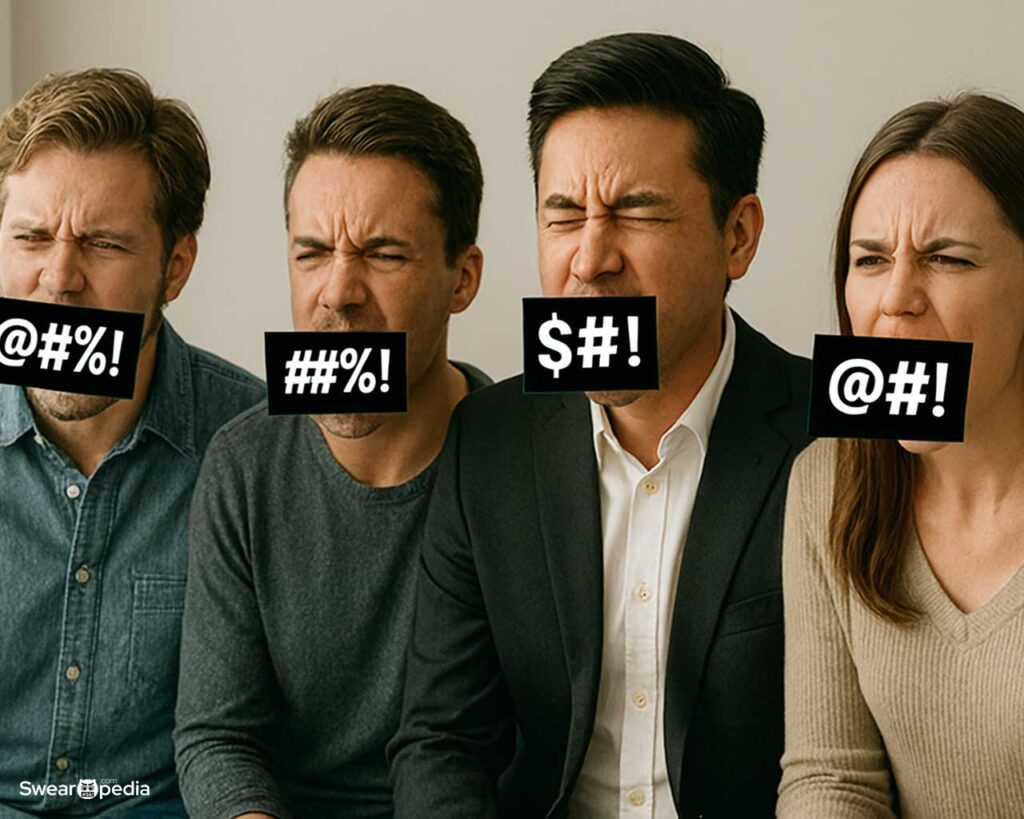Do you swear? Then you’re probably more honest, a better teammate, and less stressed – science says so! 😊
“Don’t use bad words—it’s rude!” If you grew up hearing that, you’re not alone. Swearing has long been labeled as impolite, aggressive, or even vulgar. But what if there’s more to it than just a lack of manners? What if swearing actually plays a meaningful role in how we connect with others? 🤔
Picture this: someone you know drops a colorful expression in conversation—not in anger, just spontaneously. Instead of being offended, you actually feel a little more at ease with them. Sound familiar? 😊 According to research, swearing can sometimes signal honesty, emotional openness, and even trustworthiness. And that’s not all—it might also boost team spirit and ease emotional pain, under the right circumstances.
In this post, we explore three fascinating studies that shed new light on the surprising social functions of profanity. We’re not talking about insults or offensive tirades, but rather the kind of everyday swearing that can serve as a natural part of informal communication. So if you’ve ever felt bad about letting a strong word slip—don’t be too hard on yourself. You might just be… human. 😄
The Link Between Swearing and Honesty
Feldman, G., Lian, H., Kosinski, M., & Stillwell, D. (2017): Frankly, We Do Give a Damn: The Relationship Between Profanity and Honesty. Personality and Social Psychology Bulletin.
DOI: 10.1177/1948550616681055
In their 2017 study, Gilad Feldman (University of Hong Kong), Huiwen Lian (University of Kentucky), and Michal Kosinski and David Stillwell (University of Cambridge) posed a surprising question: Could there be a connection between swearing and honesty? While profanity is often associated with poor vocabulary or uncontrolled anger, what if the opposite is true?
The researchers conducted three separate studies with thousands of participants to explore how the frequency of profanity use relates to honesty—both in personal behavior and online expression.

The image is for illustrative purposes only.
Study 1: Questionnaires and Propensity to Swear
In the first study, 276 participants completed a personality test and a profanity-use questionnaire. The researchers wanted to know whether people who swear more frequently are also more honest. Using a standard “lie scale” to detect socially desirable but dishonest responses, they found that frequent swearers were less likely to give insincere answers, indicating higher personal authenticity.
Study 2: Social Media Language Analysis
In the second study, the team analyzed the public Facebook posts of 73,000 users. Many of the participants had also completed personality surveys. The results showed that users who used profanity more often in their posts also scored higher in honesty-related traits—particularly openness and low manipulation tendencies (i.e., low Machiavellianism).
Study 3: State-Level Analysis in the U.S.
The third study took a macro-level approach, comparing profanity usage and integrity indicators across U.S. states. In regions where people swore more frequently (based on social media data), corruption levels were generally lower. While this is only a correlation—not a causal link—it further supported the researchers’ hypothesis.
Conclusion: Swearing Might Be a Sign of Honesty
The main takeaway is that profanity—especially when non-aggressive and spontaneously expressive—often correlates with greater openness, authenticity, and honesty. This challenges the stereotype that swearing is a sign of a lack of refinement: it may instead reflect emotional sincerity and personal integrity.
Swearing and Team Cohesion in the Workplace
Daly, N., Holmes, J., Newton, J., & Stubbe, M. (2004): Swearing at Work and Permissive Leadership Culture: When Anti-Social Becomes Social and Incivility Is Acceptable.
Link on ResearchGate
In this 2004 study, researchers Nick Daly, Janet Holmes, Jonathan Newton, and Maria Stubbe from Victoria University of Wellington explored an unconventional question: Can swearing actually help build stronger teams at work? The study was part of the Language in the Workplace Project, which analyzed real-life workplace interactions from both linguistic and social perspectives.
Traditionally, swearing is seen as disruptive, aggressive, or simply unprofessional. But Daly and his colleagues found that in the right context and tone, swearing can actually strengthen group bonds and reduce stress—especially in male-dominated environments.

The image is for illustrative purposes only.
Observing Real-World Workplace Interactions
The team recorded over 400 hours of workplace conversations across various organizations, including private companies and public institutions. These included informal chats, meetings, and day-to-day exchanges. One of the key findings was that profanity—when not used to insult, intimidate, or belittle others—often served to relieve tension, foster camaraderie, and even inject humor into the work environment.
The Role of Permissive Leadership
In workplaces where leadership embraced a more relaxed and informal style, swearing was much more likely to be accepted as part of the communication culture. In these settings, swearing functioned as a kind of shared code, signaling inclusion and solidarity. The authors coined this dynamic a “permissive leadership culture,” where what may seem anti-social on the surface actually serves a pro-social function.
The Line Between Helpful and Harmful
The study also emphasizes that context is everything. Swearing only had a positive effect in workplaces where informality and mutual respect were already part of the culture. In more hierarchical or formal environments, or where power dynamics were misused, profanity could still alienate or damage relationships.
Conclusion: Swearing as the Language of Team Spirit
The study suggests that swearing—when culturally embedded, mutually accepted, and not meant to harm—can act as a social glue in the workplace. In teams that value directness and openness, colorful language isn’t necessarily destructive—it can actually help build trust, boost morale, and affirm group identity.
Swearing and Social Pain Relief
Philipp, M. C., & Lombardo, L. D. (2017): Hurt Feelings? Swear! The Roles of Profanity and Gender in Emotional Coping. The Journal of Social Psychology.
APA PsycNet link
In their 2017 study, psychologists Mark C. Philipp and Laura D. Lombardo explored whether swearing could help alleviate emotional distress caused by social rejection. While previous studies had already shown that profanity can increase pain tolerance (e.g., in cold pressor tests), this research focused on a different kind of pain: being excluded by others.

The image is for illustrative purposes only.
Simulating Social Rejection
Participants (N = 123) were placed in a lab-based scenario where they were led to believe they were being intentionally excluded from a group activity. After this emotionally painful experience, the participants were split into two groups: one was instructed to swear repeatedly for two minutes, while the control group repeated neutral words.
Measuring Emotional and Physical Stress
The researchers assessed both self-reported emotional pain and physiological stress responses (e.g., heart rate, skin conductance). Those who were allowed to swear reported significantly lower levels of emotional pain and stress compared to the neutral-word group. Interestingly, the effect was strongest among participants who reported swearing less frequently in everyday life—suggesting a kind of psychological “release” effect.
Gender Differences
The study also examined gender-related trends and found that women seemed to benefit more from swearing in this emotional context. The authors suggest that, because swearing is often less socially accepted for women, its use in moments of distress may offer a stronger emotional release.
Conclusion: Swearing as Emotional Self-Defense
This research shows that profanity can be more than just an emotional outburst—it can act as a conscious coping strategy in the face of social pain. When used spontaneously and appropriately, swearing can serve as a psychological safety valve, especially during experiences of rejection, humiliation, or embarrassment.
Swear from the Heart, Not Just the Mouth
So next time a strong word slips out, don’t rush to cover your mouth. Maybe you’re just being honest. Maybe you’re bonding with someone. Or maybe you’re walking that fine emotional line between “no comment” and “if I don’t let this out, I’ll explode.” 😄
Science says: sometimes the dirtiest words are the most genuine. You don’t need to end every sentence with a curse, but when one slips in now and then? That’s not failure—it’s humanity. And let’s be honest: a well-timed swear can sometimes speak louder than a six-slide PowerPoint.
From a linguistic point of view: it’s not the word itself, but how, when, and why you say it. And sometimes, a swear word is just your brain’s way of shouting: “Hey, I’m here, and I mean this.” 😊

 Español
Español Deutsch
Deutsch Português
Português Magyar
Magyar Italiano
Italiano Français
Français Polski
Polski Română
Română Русский
Русский Türkçe
Türkçe العربية
العربية